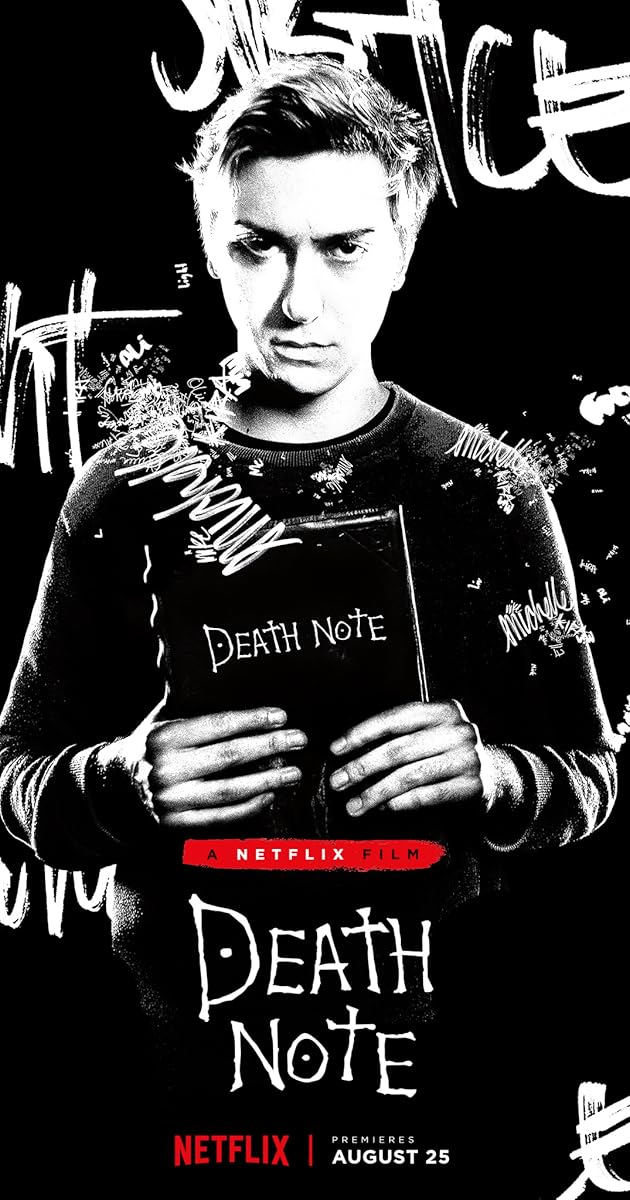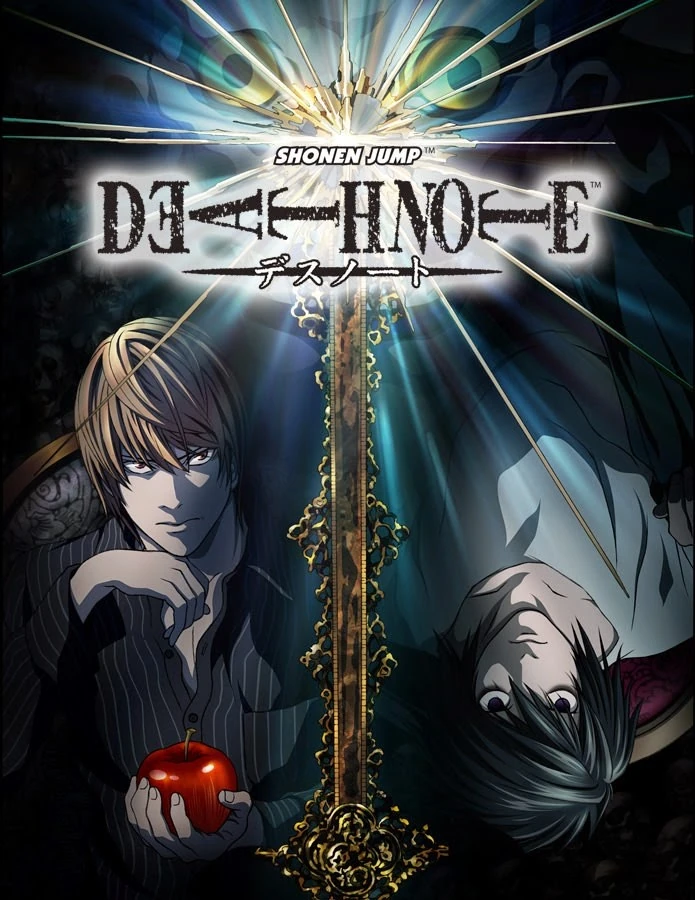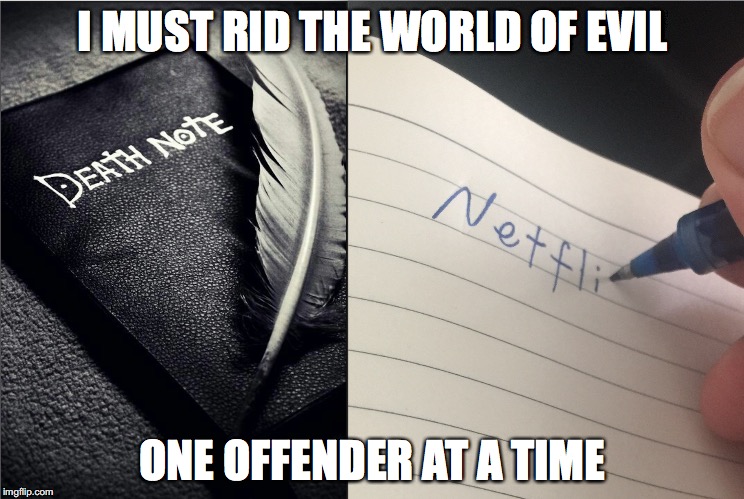 I'm going to give in and talk about Netflix's attempt at a Death Note movie. Before I do, I need to clear some things up.
I'm going to give in and talk about Netflix's attempt at a Death Note movie. Before I do, I need to clear some things up.1) Unlike my other reviews, I have NOT watched the movie and I will NOT be watching this movie. Why? Simply because I think the movie will suck and be a waste of my time and the reviews and reactions seem to have proven to me so. Therefore, I will take my money and spend it on something worthwhile. I refuse to contribute to studios and companies making terrible movies and people watching and paying for them because they didn't want to watch them. That makes no sense, and it gives these people what they want: money.
2) This movie has been bothering me for a while because I think people have been misunderstanding this movie. Some people like it because it's "so bad it's good". Some people hate it because its bad. Some people like it because it was different and some people hate it because it was different. People can like and dislike whatever they want, but from the arguments I've heard, people have been missing the most important point when making any adaptation. So, I'm going to address that as well.
3) As I have not seen the movie, these criticisms will come from what I've seen and heard. Furthermore, I'm not here to tell you why this movie is good or bad, but rather how, and why it failed as an adaptation.I repeat, This Non-review is not about my thought's on Netflix's Death Note adaptation but understanding why this movie failed as an adaptation.
4) Whatever critiques I have will NOT be towards the director for I don't know how much say he actually had in this movie. Film is a collaborative effort and sometimes a director has the least control in a production. In other words, my criticisms will be addressed to Netflix as a stand in for the director, producers, the studio executives, screenwriters, etc.
5) Seeing how I'm going to be talking about how the story was adapted, I'll be referencing many details about the Story in the anime (aka, SPOILERS).
Let's start from the beginning: What is Death Note?
Very long story short, Death Note is a manga series written by Tsugumi Ohba and Takeshi Obata that ran from 2003 to 2006 (Spanning 12 volumes). It was adapted into an anime series in 2006 and finished airing on June 2007. The Story is about a high school student, Light Yagami, who stumbles across the Death Note: a notebook capable of killing anyone as long as you have a name and a face. As Light begins to kill a bunch of criminals (under his alias Kira), a police task force is formed to capture him lead by world famous detective L.

What is Death Note about?
Some people might be wondering already if I forgot to mention the shinigami (or Gods of Death) in my brief synopsis and to answer that: No, I haven't. I deliberately left them out to make a very clear point about Death Note. Doesn't matter how you interpret the story, Death Note is about HUMAN AFFAIRS.
The Wisecrack channel on YouTube made an interesting video on the Philosophy of Death Note and described the anime as a Socratic Dialogue. This is a very accurate description of the series because Death Note asked some questions about Justice, Morality, Tyranny, and Society, but never gave us an answer. We are tasked to ask ourselves these questions, discuss them, and maybe come up with answers. The story was carefully constructed to be a tool for discussion and the "Gods" serve one of the main starting points of this philosophical discussion: They don't care about our ideals. Its all meaningless to them. Having Ryuk, Rem, and other shinigami partake in the action allow for the story happen but also show the detachment between Gods and Humans.
Let's take a look at character motivations: characters like Light, L, Chief Yagami, Misa, Near, Mello, and the police task force have their motivations rooted in some sort of "greater good" (Justice, Family, Civil Protection, Love, etc). Characters like Ryuk, Rem, Jealous, and Sidoh have their motivations rooted in boredom and self interest. Ryuk explicitly states throughout the entire series that he has no alliance to neither Kira nor L and the anime makes it very clear that when he helps Light is because of his own self interest (for example, when Ryuk located all the cameras in Light's house because Light convinced him that he could eat apples if he found a blind spot). Sidoh is especially important because he's whole introduction and character arc is that he wants his notebook back. Sidoh is such a pointless character that I had to look him up. Why bother writing someone like him into the story? Simple, to drive the point home that they are NOT interested in our "greater good".
What's my point here? Well, if you are writing a story about Justice, Good, and Evil, having an all powerful being sway the characters one way or the other takes away from the meaning of their actions. If I went to trial for murdering 7 children and proved that I was commanded by God or possessed by Satan to do so, then I'm not evil. I didn't do anything, in fact, I maybe wasn't even in control: it was God's will. Death Note, by removing all powerful beings from influencing our characters makes them responsible for their actions and makes them have to justify their philosophy.
Before I move on to Netflix, let's talk some history. For those who don't know, Death Note is semi-based on a real life story. Shoko Asahara was the leader of the Aum Shinrikyo cult in Japan (formed in 1984). He believed himself to be a god and the world to be rotten. Asahara believed that in order to cleanse the world of evil, he needed to kill off criminals. He even called himself the "Killer Christ".
On March 20th, 1995, followers of the Aum Shinrikyo committed a terrorist attack in the Tokyo Subways using sarin Gas. Anyone who has read the manga or seen the anime will already see some similarities between Shoko Asahara and Death Note's Light Yagami. However what Tsugumi Ohba and Takeshi Obata wanted to tell with Death Note was a morality tale about evil born out of good intentions. I think I can safely say we all want to make the world a better place but where does this sentiment end and evil begins? Furthermore, if we are to rid the world of evil, what is good and what is evil? Tsugumi Ohba and Takeshi Obata felt this story was so important that they went out of their way to bathe Death Note in Western Theology, Philosophy, Art, and Literature (some even speculate that some characters mirror William Shakespeare's play Julius Caesar) so it could be read and understood by not just the Japanese audience, but also a western audience.
/cdn.vox-cdn.com/uploads/chorus_image/image/56346491/DN_04298.0.jpg)
What does this has to do with Netflix's Death Note?
Well, everything. First, let's be clear on what an adaptation is supposed to be. It is taking a work or story and make it suitable for a different medium. This does not mean, of course, making a frame by frame copy of a work. This is not suitable because, in that case, why just not go enjoy the original work? Also because every medium of entertainment has its pros, cons, and limitations. While settings and descriptions can be simply shown instead of having to write down 6 pages to let your audience know what a room looks like, a book can be as long as it wants and cram as many details as the author likes. A film has a limited time frame and that time frame is (to most people) 3 hours at most. Therefore, when a book is turned into a film, changes MUST be made. However, when is it good to change something and when is it good to leave it intact? To put it simply: When it doesn't affect the core of the story and characters.

I enjoyed the Japanese Live Action movies of Death Note. I even thoroughly enjoyed the Musical (yes, there is a Broadway-style Death Note Musical). Most people would ask me how can I excuse these adaptations and not Netflix's interpretation? Because they get it. The Japanese Live Action movies from 2006 and the Musical made changes to the story to fit their medium. They added characters, removed characters, remove events, even change the endings to fit better the story in their respective medium. Where they all good changes? No, some were terrible and others laughable. However, after its all said and done, the story and its message are not affected in any way, shape, or form. The characters are still who they were in the original source material and their motivations are not changed. The opening number of the musical establishes the main question of the entire series: what is justice and is there such thing as justice? The freaking musical that I watched AS A JOKE had a better understanding of its source material than a 40 Million Dollar budget Feature Film.
Netflix,on the other hand, dumb down the source material for a wider audience. The screenwriters took this morality tale about two geniuses playing a game of cat and mouse claiming their actions to be in the name of Good and Justice and turned it into a Final Destination knock-off. What? Why!? Was the gore necessary? Film Theory made a pretty interesting estimate on how many people die in the anime and as you would expect, it is a lot. I bring this up because what MatPat does in this video is shed some light into Kira's actions throughout the anime in the form of how many people were killed by Kira and how many people might've been actually innocent. While the estimate he makes does make you contextualize the power of the Death Note if it were real, the point I want to make is the following: So many people die in the anime throughout Kira's reign but how much blood do we see?

This is the main problem with Netlix's Death Note movie. The story taking place in Seattle, the characters being American, Mia being a cheerleader and not a model, these changes make sense. Ryuk being the more traditional devil, Light being a complete idiot, Mia manipulating Light, these are the changes that bother me. Netflix not only tries to "make it appealing for a wider audience" (which on itself it's pretty insulting because there's some unflattering assumptions about their audience if this is what they came up with) but make changes that ultimately change the core of the story. Why change the essence of the characters? Why change the heart of the conflict? Why change the message? Really, a Prom in Death Note? My problem with this particular movie is all the unnecessary changes they made to a story that was fine on its own. To quote another YouTuber, The Dom, "If You're Going to tell your own story, THEN TELL YOUR OWN STORY". In fact, this whole issue could've been avoided if the writers had decided to change Light's name entirely, remove L from the story, used a different Shinigami that was more devious than Ryuk, and just set it in the same universe as the anime. Kira's story in the anime ends in 2012, setting the story in 2017 with new characters and a new Death Note as some sort of sequel/spin-off movie would've solved most of this film's problems. You could've told the story YOU wanted, with no need to consult the source material (assuming they even did look at the source material), and nobody would've compared it to the original. It would've been judged as its own thing that just so happens to be in the same universe as the original series.
Conclusion.
Joey The Anime Man tried defending this movie but not in a "its a good movie" kind of way. He makes it clear that it is terrible but enjoyable. Again, some people claim Netflix's Death Note is a movie that is "so bad it's good" like The Room, The Happening, and The Lady in the Water. To be fair, what I've seen online does seem pretty unintentionally funny and I've heard William Defoe's acting is pretty good. This is all well and good but I bring him up for a different reason. He makes a point that this movie had a $40 Million budget, which is too much money for this film to be a cash-grab (going as far as to call it a "Passion Project").
However, this is the type of mentality I want to prevent. A $40 Million budget for a cash-grab is not a lot of money. The Emoji Movie's budget was $50 Million. 50 Shades of Grey's budget was $40 Million. The budget for Foodfight! (which currently holds a score of 1.7 out of 10 in IMDb) was $65 Million. Studios will give a ton of money for a franchise that have already proven to be successful, specially now with the amount of online reviewers. Netflix's Death Note was a mediocre film and I wouldn't call it a "passion project" by ANY stretch, and we shouldn't have indulged it. Today, the less people want to watch a film or the worse a film is or appears to be, the better it performs. The Emoji Movie (which, again, had a budget if $50 Million and has a 9% on Rotten Tomatoes) grossed over $200 Million world wide, People who knew it was going to be bad still went and watched it to rant about how bad it was. In fact, this mentality and the surge of online content creators might benefit the movie if it IS bad. If the movie is bad, then more people will want to make Rants and Reviews on YouTube, giving the movie free publicity and making others wanting to watch the movie to ride the Trend Train. In the end, it's a lot easier to write and make fun of something that is bad rather than something that is good. People who don't make online content, will want to watch the movie just to see how bad it was. It's similar to Uwe Boll's Videogame movies: it took a property with an established fanbase to make a secure profit, and benefited from the movies being bad through legal loopholes.
This is the part that bums me out the most: in our "ironic enjoyment" philosophy, we accepted the mediocrity we were given instead of demanding for something better. Furthermore, no matter how much we complain, rant, or analyze how bad a product is, we still bought it. They made a profit.
The same reason why they are so many Transformers movies despite everyone agreeing unanimously after the second one came out how all of them are trash. By the time we fight back with reviews and critiques, they have already won. Their goal was to make a profit and with junk food entertainment they did. I didn't want to write a review for the Death Note movie because I didn't want to give this garbage anymore free publicity. I could pull out a complete philosophical, psychological, and literary analysis of the manga and the anime, compare it to the adaptation, give it an accurate review on what it did wrong and right and why, and give it a review both as a stand alone film and as an adaptation (both from a production stand point and from a narrative stand point). As I said before, however, it would've change nothing and only benefited the film. The best thing I could've done as a reviewer, movie goer, and an aspiring filmmaker was to do nothing and let the film die. This Non-review was not about my thought's on Netflix's Death Note adaptation, it was about understanding why this movie failed as an adaptation, why this movie is offensive to its source material.



